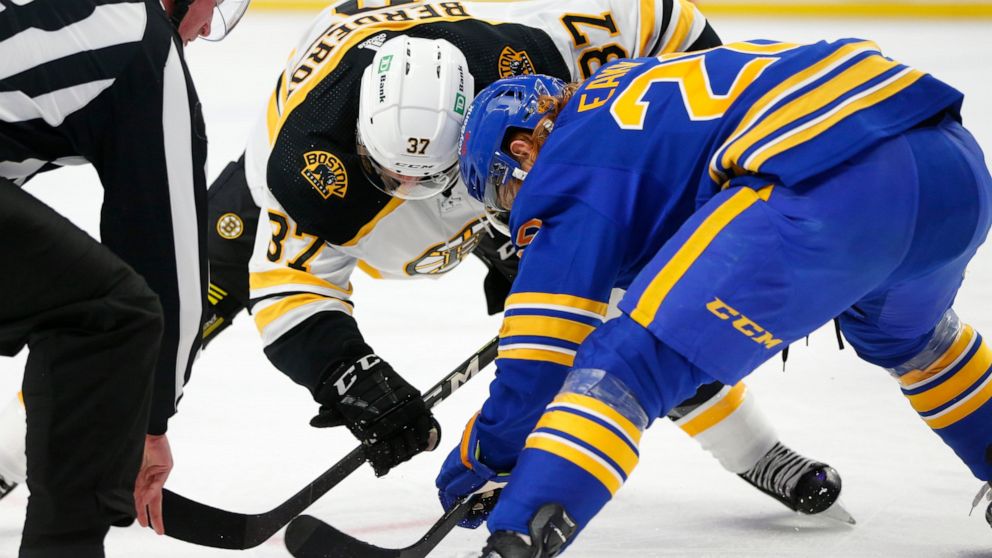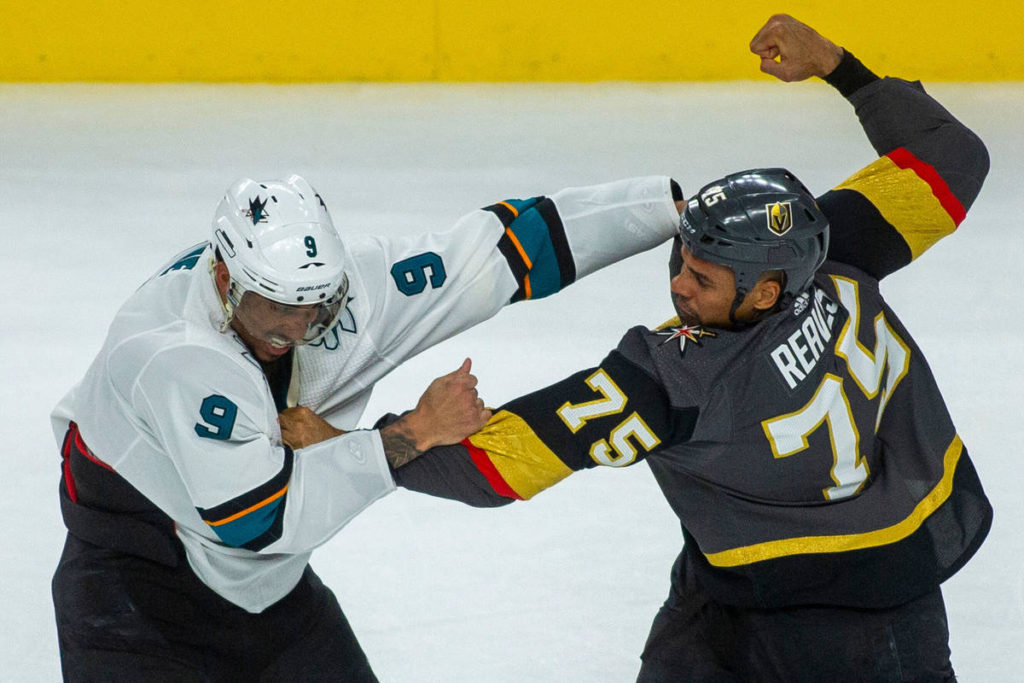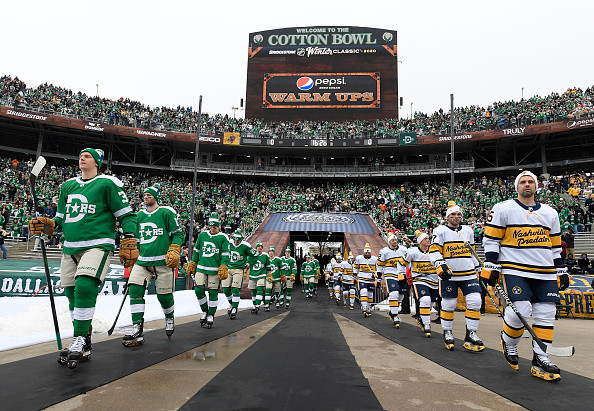Written by Justin Bott
The NHL has done things differently for a long time. It’s the only of the four major sports leagues with offsides, four All-Star teams, more than one Canadian team and of course, fighting. Not every league can be the same since every sport is so different, but some things that the NHL does is head-scratching. One of these head-scratchers is the four eight-team NHL divisions that includes too many teams per division. Both the NBA and MLB have two conferences and three divisions consisting of five teams. The NFL, with the same number of teams as the NHL, has two conferences with four divisions of four teams.
Something must change with the NHL because the league pales in comparison to its football, basketball and baseball counterparts. An aspect that should change is the crowded divisions. I decided to realign the NHL divisions, NFL- style with location as a compass, but rivalries as a driving factor (see the AFC East’s Miami Dolphins and NFC East’s Dallas Cowboys).
Also, I named all the divisions North, East, South and West and kept the Eastern and Western Conference, so forgive the lack on creativity on the names.
But what would these new divisions look like?
EASTERN CONFERENCE
North Division:
- Toronto Maple Leafs – 30-12-3 (63 pts.)
- Boston Bruins – 27-16-3 (57 pts.)
- Buffalo Sabres – 14-24-8 (36 pts.)
- Montreal Canadiens 8-32-7 (23 pts.)

The North Division of the Eastern Conference had a lot of candidates; Ottawa is a main one since they played in the Northeast division with these teams from 1998-2013. Settling with Buffalo, Boston, Montreal and Toronto seemed right, though.
All teams are close geographically and all had their fair share of scuffles with one another over the years. Obviously with three Original Six teams in the same division, these teams have seen each other a lot and developed a hatred for each other over the years.
Buffalo’s biggest rival, the Bruins, have played in the same division since the Sabres’ inception . They’ve played the B’s more than any other team including eight playoff matchups. As for the Canadiens and Maple Leafs, the Sabres have played them the second and third-most times in their history behind the Bruins. Though the Sabres haven’t been competitive recently, the other three teams have maintained a steady rivalry against one another. The Bruins played the Habs and Maple Leafs a combined five times in the 2010s. Also, Montreal won a tightly contested playoff series against Toronto just last season.
East Division:
- Pittsburgh Penguins – 29-11-8 (66 pts.)
- New York Rangers – 30-13-4 (64 pts.)
- Washington Capitals – 26-14-9 (61 pts.)
- New Jersey Devils – 17-26-5 (39 pts.)

Half of the Metropolitan Division reunites for the formation of the East Division. The New York Islanders and Philadelphia Flyers also made a good case for this list, but in terms of recent rivalries, this alignment made the most sense.
This division is sure to have some heated rivalries headlined by the Crosby-led Penguins and Ovechkin-led Capitals. The Penguins and Capitals have played 26 playoff games against each other since Crosby and Ovechkin were drafted and each matchup gets intense. Washington has played Pittsburgh more than any other team in their history. The Capitals and Penguins have played in the same division for 26 seasons including this one (1974-79, 1981-93, 2013-present), so it only makes sense to keep them in this one.
The rivalry between the Rangers and the Devils has been well-documented, too. Who could forget the famous playoff matchup between them that saw “The Avery Rule” come into play? The Devils have played the Rangers more than any other team in their history. And whenever they play each other in the playoffs, it’s a fun watch. The overall playoff record is 18-16 in favor of the Rangers, and they have won four of the six playoff series.
All teams in this division have played each other a lot, with over 3,400 games played between one another including playoffs. This division would be a great one and has a lot of potential.
FUN FACT: The East and North divisions would hold the most No. 1 overall picks on their rosters (5). The North has Buffalo’s Owen Power and Rasmus Dahlin, Toronto’s Auston Matthews and John Tavares and Boston’s Taylor Hall. The East has New Jersey’s Jack Hughes and Nico Hischier, New York’s Alexis Lafrenière, Pittsburgh’s Sidney Crosby and Washington’s Alex Ovechkin.
South Division:
- Florida Panthers – 32-10-5 (69 pts.)
- Tampa Bay Lightning – 31-11-6 (68 pts.)
- Carolina Hurricanes – 32-11-3 (67 pts.)
- Arizona Coyotes – 12-32-4 (28 pts.)

Without a doubt, this would be the toughest division in hockey this year. You have three of the top four teams in the NHL this year with a back-to-back Stanley Cup Champion and two division leaders.
The Lightning and Panthers have an obvious history with the two teams being introduced a season apart and playing in the same division since both the teams have been in the NHL. They finally played in their first playoff series against each other in 2021 and the Lightning came out victorious, winning 4-2. That same postseason, the Bolts played their first series with the Canes which they won en route to Tampa Bay’s second straight Stanley Cup. Florida, Tampa Bay and Carolina also played in the same division from 1998-2013.
Arizona is not only the outlier in terms of record, being a bottom-two team this year, but they don’t have notable history with any of these teams either. The other three teams have played in the Eastern Conference for most of their tenure in the NHL while Arizona has played in the West. Arizona lines up with these teams simply based on the fact that it’s somewhat South. Arizona’s technically in the West, but it’s in the southwest, so just agree with me to make this less complicated. Hopefully, they’ll be able to compete soon because playing in this division would be tough in itself.
West Division:
- Colorado Avalanche – 33-8-4 (70 pts.)
- Minnesota Wild – 29-11-3 (61 pts.)
- Vegas Golden Knights – 28-17-3 (59 pts.)
- San Jose Sharks – 22-20-4 (48 pts.)

This division is the only one that comes with four teams that flip-flopped from one conference to the next. This could also prove to be one of the toughest divisions in hockey if the Avalanche turn it around sometime soon.
The rivalries here are simple: the Minnesota Wild and Colorado Avalanche have a well-known playoff history and so do the Vegas Golden Knights and San Jose Sharks. The Wild have played the Avs the most times in the regular season and postseason. Out of the three playoff series, two have gone to seven games and nine of the 20 games have gone to overtime.
If anyone has watched the Golden Knights in the playoffs, they’ll know about their heated rivalry with the Sharks. Though the rivalry was mainly driven by Ryan Reaves and Evander Kane, who aren’t on these teams anymore, there’s still bad blood there. In 2019, the Sharks got payback on the Golden Knights by eliminating them in Game 7 of the first round thanks to a three-goal comeback. Recently, Vegas has taken the edge and has won nine straight against San Jose, but both these teams despise each other.
With all four teams mixing it up, it should be a great sight to behold.
WESTERN CONFERENCE
North Division:
- Calgary Flames – 26-13-6 (58 pts.)
- Edmonton Oilers – 24-18-3 (51 pts.)
- Vancouver Canucks – 22-21-6 (50 pts.)
- Ottawa Senators – 16-24-4 (36 pts.)

This all-Canadian division is surprisingly one of the tighter ones in my new Western Conference because Vancouver has turned things around since hiring Bruce Boudreau.
This division works to heighten the “Battle of Alberta” rivalry that’s been going on since 1980, when the Oilers came to the NHL and the Flames relocated to Calgary from Atlanta. The interprovincial rivals haven’t met in the playoffs in 30 years, but they have no love lost for one another. According to hockeyfights.com, both these teams have fought each other more times than any others in Edmonton and Calgary history.
As for the Canucks, they’ve been playing in the same division as the Flames and Oilers since 1981. All three teams in western Canada have seen each other a lot and would continue to see each other a lot more.
Ottawa is kind of an oddball here since they’re located in the northeast (35+ hours from each city). However, they did play in a division with these teams last year, and hopefully they can turn things around soon.
East Division:
- St. Louis Blues – 27-14-5 (59 pts.)
- Chicago Blackhawks – 17-24-7 (41 pts.)
- New York Islanders – 17-19-6 (40 pts.)
- Philadelphia Flyers – 15-24-8 (38 pts.)

Unfortunately, this is the worst division in my realignment; the Blues are the only decent team, and even they wouldn’t be in a playoff spot in the other conference.
Two teams swapping conferences here are Metropolitan foes the Flyers and Islanders. All teams in the Metropolitan Division are very familiar with each other, so it’s no surprise that the Isles and Flyers have played each other over 300 times. Either of these two teams could’ve made it into the East of the Eastern Conference, so it only felt right to reunite them in this division.
As for St. Louis and Chicago, these two teams have had it out for each other ever since the Blues were introduced. In 1970, three years after the Blues became established as an expansion team, the Blackhawks were placed into the Blues’ division. Ever since then, the two teams haven’t been in separate divisions (besides the COVID realignment year). St. Louis has played Chicago more than any other team and Chicago has played St. Louis more than any non-original six team.
The Blues and Blackhawks were also part of the NHL’s infamous “St. Patrick’s Day Massacre” where 12 players got ejected as the result of a brawl that broke out and left a total of 278 penalty minutes between the teams. The two teams have also played in 12 electrifying playoff series and the 2017 Winter Classic. All the teams here are sure to have some more classic matchups in the near future.
South Division:
- Nashville Predators – 28-16-4 (60 pts.)
- Dallas Stars – 25-18-2 (52 pts.)
- Detroit Red Wings – 22-21-6 (50 pts.)
- Columbus Blue Jackets – 23-22-1 (47 pts.)

This division consists of a few teams that aren’t “South,” but there’s only so many to choose from (sorry Columbus and Detroit).
When it comes to the Columbus Blue Jackets, they have a good amount of games played against every team. They’ve played 109 games with Detroit including four playoff games, 95 games against Nashville and 69 games against Dallas. That might not seem like a lot, but considering that Columbus hasn’t made the playoffs a lot, has only been playing since 2000 and switched divisions in 2013, it’s relatively a lot.
When the Blue Jackets were introduced, they also played in a division with Nashville and Detroit. The Preds and Blue Jackets also weren’t very good for their first five years in the NHL, so making the franchises familiar with each other was a smart move by the NHL. I want to bring them back together now that they’re both frequent playoff teams.
Nashville has played Dallas and Detroit a lot as well (combined 227 games, including 23 playoff games). Recently, the Stars and Preds have developed a nice rivalry. Nashville and Dallas played in the 2019 playoffs and the 2020 Winter Classic; the Stars won both series, upsetting the division-winning Preds in 2019. It’s one of the more underrated rivalries in the league, and I believe they’d work great in a division together.
West Division:
- Los Angeles Kings – 24-16-7 (55 pts.)
- Anaheim Ducks – 23-17-9 (55 pts.)
- Winnipeg Jets – 20-17-7 (48 pts.)
- Seattle Kraken – 16-28-4 (36 pts.)

Last, but not least is the West Division of the Western Conference.
In this one, we’re revamping the Freeway Face-Off between the Ducks and Kings. Anaheim, Los Angeles and San Jose dominated the Pacific Division in the 2010s, combining for 23 playoff berths during the decade. Though the Sharks have developed their own feud with the Golden Knights, both Anaheim and LA still have it out for each other. Since they’re so close in proximity to each other (about 25 miles), the games always get heated with fans as well as players.
As for the two other teams, the Jets and Kraken, neither team really has an established rival yet. For the Kraken, it makes sense since it’s literally their first season in the league. For the Jets, it’s strange that they haven’t established a rivalry with any team since they’ve been back in Winnipeg for a decade. I figured placing them with another team without a rival along with two teams with a heated rivalry should spice things up a bit.
- One Take for Each Game One of the NBA Playoffs
- Things I Learned Watching ‘WrestleMania IX: Becoming a Spectacle’ on PeaPenis (Peacock)
- Wrestling With Emotion – ‘The Long, Winding Road’ | Sponsored by Batavia Downs
- Banditos Pod Episode 4 ‘Clinch-urtunity’
- The White Lotus Stampedes Through the Finish Line

One Response